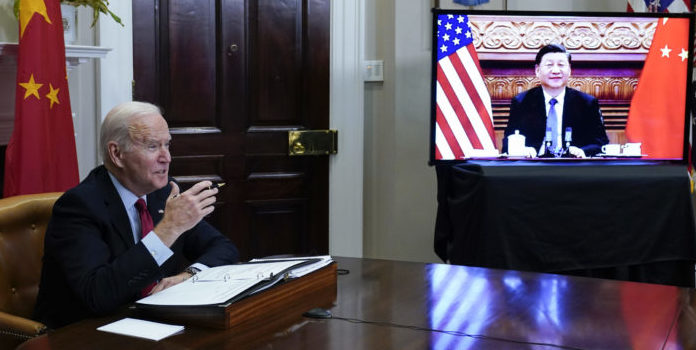(Headline USA) President Joe Biden was speaking Thursday morning with China’s Xi Jinping, the fifth conversation of their presidencies, as the two leaders chart the future of their complicated relationship at a time of simmering economic and geopolitical tensions.
The call, which began at 8:33 a.m. EDT, comes as Biden aims to find new ways to work with the rising global power as well as strategies to contain China’s influence around the world.
Differing perspectives on global health, economic policy and human rights have long tested the relationship—with China’s refusal to condemn Russia’s invasion of Ukraine adding further strain.
The latest pressure point has been House Speaker Nancy Pelosi’s potential visit to Taiwan, the island that governs itself democratically and receives informal defensive support from the U.S., but which China considers part of its territory.
Beijing has said it would view such a trip as a provocation, a threat U.S. officials are taking with heightened seriousness in light of Russia’s incursion into Ukraine.
“If the U.S. insists on going its own way and challenging China’s bottom line, it will surely be met with forceful responses,” Zhao Lijian, a spokesperson for China’s Foreign Ministry, told reporters earlier this week. “All ensuing consequences shall be borne by the U.S.”
Pelosi would be the highest-ranking U.S. elected official to travel to Taiwan since Republican Newt Gingrich visited the island in 1997 when he was House speaker. Biden last week told reporters that U.S. military officials believed it was “not a good idea” for the speaker to visit the island at the moment.
“I think what the President was saying is—maybe the military was afraid our plane would get shot down or something like that by the Chinese,” Pelosi responded Wednesday, refusing to confirm her travel plans due to the “security issue.”
John Kirby, a U.S. national security spokesman, said Wednesday that it was important for Biden and Xi to regularly touch base.
“The president wants to make sure that the lines of communication with President Xi remain open because they need to,” Kirby told reporters at a White House briefing. “There are issues where we can cooperate with China on, and there are issues where obviously there are friction and tension.”
The president’s ability to push back against the Asian superpower has come into question, however, not only due to Biden’s own feebleness and diminished mental acuity, but also amid rampant speculation that he and his family may have been comprimised by the business dealings involving Biden’s son Hunter.
Several deals made during Biden’s tenure as vice president have been under investigation by the Justice Department, including at least one that promised a 10% cut to the “Big Guy” from an investment with a state-run Chinese energy company.
Biden’s inflationary economic policies would also appear to benefit China as the largest rival economic force, amid recent reports that it may be leading an anti-American alliance that includes Russia, India, Brazil and South Africa in devising an alternative global reserve currency to the U.S. dollar.
China—currently the second-largest holder of U.S. debt after Japan—also has been involved in major acquisitions of real-estate and farmland in the U.S., raising alarm that it may seek to undermine or manipulate the global food supply.
Biden and Xi last spoke in March, shortly after the Russian invasion of Ukraine.
“This is one of the most consequential bilateral relationships in the world today, with ramifications well beyond both individual countries,” Kirby said.
The conversation comes as Biden has moved to shift U.S. reliance off Chinese manufacturing, including Senate passage Wednesday of legislation to encourage semiconductor companies to build more high-tech plants in the U.S.
Biden wants to marshal global democracies to support infrastructure investments in low- and middle-income nations as an alternative to China’s “Belt and Road Initiative,” which aims to boost China trade with other global markets.
Kirby listed a number of areas of U.S.–China friction that he said would be part of the conversation, including “tensions over Taiwan, tensions over … China’s aggressive course of behavior in the Indo-Pacific outside of Taiwan, tensions in the economic relationship” and over China’s reaction to Russia’s war in Ukraine.
Biden, who has kept in place Trump-era tariffs on many Chinese-manufactured goods in order to maintain leverage over Beijing, is weighing whether to ease at least some of them in a move to lessen the impact of soaring inflation on American households.
U.S. officials have also criticized China’s “zero-COVID” policy of mass testing and lockdowns in an effort to contain the spread of COVID-19 in its territory, labeling it misguided and fretting that it will further slow global economic growth.
Other points of strain include China’s treatment of Uyghur Muslims, which the U.S. has declared a genocide, its militarization in the South China Sea, and global campaign of economic and political espionage.
Adapted from reporting by the Associated Press

